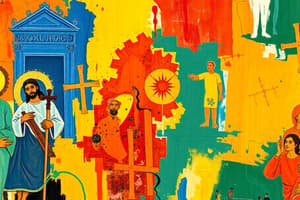Podcast
Questions and Answers
What does 'Agape' mean?
What does 'Agape' mean?
An early Christian religious meal that was at first closely related to the celebration of the Eucharist and often preceded this celebration; word means 'love'.
What is meant by 'Apocryphal'?
What is meant by 'Apocryphal'?
A work of literature that looks like scripture, but is not divinely inspired.
Who is an Apologist?
Who is an Apologist?
One who writes a work in order to defend and explain the Christian religion.
What does the word 'Apostle' mean?
What does the word 'Apostle' mean?
What is Apostolic Tradition?
What is Apostolic Tradition?
Who are Catechumens?
Who are Catechumens?
In the scriptures, the ________ is described as the Body of Christ and the Temple of the Holy Spirit and 'thing belonging to the Lord'.
In the scriptures, the ________ is described as the Body of Christ and the Temple of the Holy Spirit and 'thing belonging to the Lord'.
What is Church History?
What is Church History?
What does 'Deposit of Faith' refer to?
What does 'Deposit of Faith' refer to?
What is the Didache?
What is the Didache?
What does Ichthys stand for?
What does Ichthys stand for?
What does martyrdom mean?
What does martyrdom mean?
What is a Presbyter?
What is a Presbyter?
What is the Sign of the Cross?
What is the Sign of the Cross?
The public revelation of Jesus ended with the death of ____.
The public revelation of Jesus ended with the death of ____.
What are the marks of the Church?
What are the marks of the Church?
What does the anchor symbolize for Christians?
What does the anchor symbolize for Christians?
Who was St. Ignatius of Antioch?
Who was St. Ignatius of Antioch?
The last apocalyptic book to be accepted into the Canon of Scripture is the book of ___.
The last apocalyptic book to be accepted into the Canon of Scripture is the book of ___.
Who issued the Edict of Milan that ended the persecution of Christians?
Who issued the Edict of Milan that ended the persecution of Christians?
Eucharist comes from a Greek word that means ___.
Eucharist comes from a Greek word that means ___.
Who wrote the Apostolic Tradition that includes the oldest existing rituals for the ordination of a priest?
Who wrote the Apostolic Tradition that includes the oldest existing rituals for the ordination of a priest?
What is a Crypt in the context of Christianity?
What is a Crypt in the context of Christianity?
Who was Innocent III?
Who was Innocent III?
When was the final and definitive list of canonical books promulgated?
When was the final and definitive list of canonical books promulgated?
In the very early church, very few people who wanted to be baptized were given the Sacrament upon asking.
In the very early church, very few people who wanted to be baptized were given the Sacrament upon asking.
John the Baptist's baptism and Christian baptism are not very different.
John the Baptist's baptism and Christian baptism are not very different.
Infant baptism was considered normal in the 3rd century.
Infant baptism was considered normal in the 3rd century.
Agape feast was discontinued early in the church because of the abuses that were denounced by St. Paul.
Agape feast was discontinued early in the church because of the abuses that were denounced by St. Paul.
Eucharist prayers in the early church were made up on the spot by the priest or bishop presiding at Mass.
Eucharist prayers in the early church were made up on the spot by the priest or bishop presiding at Mass.
Christians' catacombs were found only in Italy and France.
Christians' catacombs were found only in Italy and France.
Christians rejected the Roman practice of cremation because it conflicted with the doctrine of the resurrection of the dead.
Christians rejected the Roman practice of cremation because it conflicted with the doctrine of the resurrection of the dead.
Catacombs were abandoned about the 5th century until rediscovered in the 16th century.
Catacombs were abandoned about the 5th century until rediscovered in the 16th century.
Christians fasted on Wednesdays as it was thought to be the day that Judas betrayed Jesus to the Jews.
Christians fasted on Wednesdays as it was thought to be the day that Judas betrayed Jesus to the Jews.
Christians worshipped on a Sunday for one reason only: it was the day the Holy Spirit descended upon Mary and the Apostles.
Christians worshipped on a Sunday for one reason only: it was the day the Holy Spirit descended upon Mary and the Apostles.
Flashcards are hidden until you start studying
Study Notes
Key Terms and Definitions
- Agape: An early Christian meal, initially linked to the Eucharist, embodying the concept of love.
- Apocryphal: Literature resembling scripture but lacking divine inspiration.
- Apologist: Individuals who defend and explain Christianity through written works.
- Apostle: Translates to "one who is sent"; refers to early Christian leaders.
- Apostolic Tradition: The transmission of the Apostles' Faith across generations.
- Catechumens: Adults undergoing long-term instruction before receiving baptism, termed "the instructed."
- Church: Described as the Body of Christ and the Temple of the Holy Spirit, representing something belonging to the Lord.
- Church History: Chronicles the life of Jesus, human actions, and the Holy Spirit's guidance in the Church.
- Deposit of Faith: The heritage of Faith in Sacred Scripture, rooted in the time of the Apostles.
- Didache: An ancient catechism that contains Apostolic teachings.
- Ichthys: An acronym meaning "Jesus Christ, Son of God, Savior" in Greek.
- Martyrdom: Dying for one's faith, viewed as an honor in Christianity for participating in Christ's sufferings.
- Presbyter: Derived from Greek, meaning "priest."
- Sign of the Cross: A ritual gesture involving tracing a cross over the body.
- St. John: The public revelation of Jesus concluded with his death.
- Marks of the Church: One, Holy, Catholic, and Apostolic attributes defining the Church.
- Anchor: A Christian symbol representing hope.
- St. Ignatius of Antioch: Credited with the first use of the term "catholic church."
- Revelation: The last recognized apocalyptic book incorporated into the Canon of Scripture.
- Emperor Constantine: Known for issuing the Edict of Milan, which ended Christian persecution.
- Thanksgiving: The term Eucharist originates from a Greek word meaning "thanksgiving."
- St. Hippolytus of Rome: Authored the oldest known rituals for priest ordination in the apostolic tradition.
- Crypt: Burial chambers for notable figures such as martyrs or popes.
- Innocent III: The first pope to refer to the Successor of St. Peter as Vicar of Christ.
- Council of Trent: Established the definitive list of canonical books in 1546.
True/False Insights
- Few early converts received baptism immediately upon request (False).
- John the Baptist's baptism closely resembles Christian baptism (False).
- Infant baptism was standard by the 3rd century (True).
- Agape feasts were discontinued due to abuses highlighted by St. Paul (True).
- Early Eucharist prayers were improvised by presiding priests or bishops (True).
- Christian catacombs exist beyond Italy and France (False).
- Christians opposed cremation due to the belief in resurrection (True).
- Catacombs were abandoned around the 5th century, rediscovered in the 16th century (True).
- Christians observed fasts on Wednesdays, commemorating Judas's betrayal (True).
- Worship on Sundays was solely due to the Holy Spirit's descent on the apostles (False).
Studying That Suits You
Use AI to generate personalized quizzes and flashcards to suit your learning preferences.





